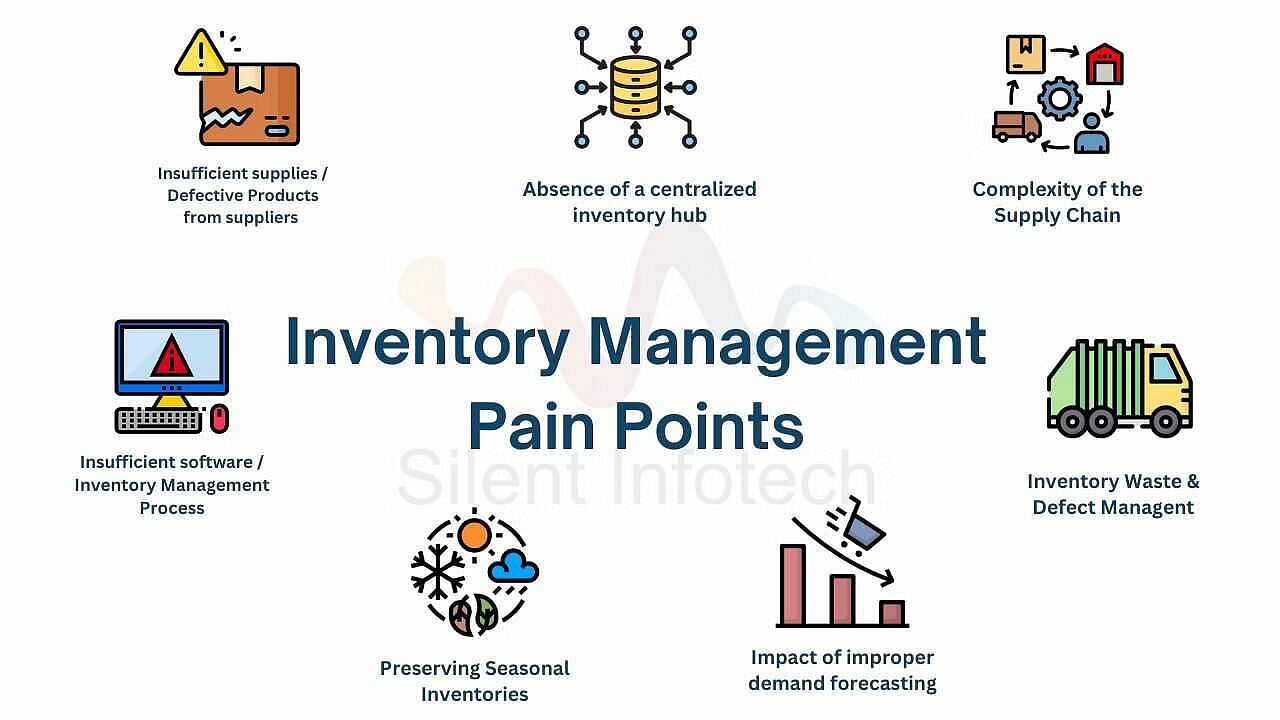Inventory Management Pain Points
Any company that deals with items relies heavily on its inventory, so you must manage it effectively to ensure the survival and expansion of your company. A company’s profitability and customer satisfaction can be built or ruined by its ability to manage inventories precisely. The complexity of inventory management can be difficult to navigate, and several pain points might impede operations and the achievement of desired results.
Here Are the Top Seven Inventory Issues Along With a Few Tips on How to Fix Them

1) Insufficient Supplies Or Defective Products From Suppliers.
One of the primary pain points in inventory management is dealing with insufficient supplies or receiving defective products from suppliers. When suppliers fail to deliver the required quantities of goods or provide items that do not meet quality standards, it can disrupt the entire supply chain. This can lead to stockouts, delayed deliveries, dissatisfied customers, and ultimately, revenue loss.
To mitigate this issue, establishing strong relationships with reliable suppliers is crucial. Conducting thorough research and due diligence when selecting suppliers ensures their ability to consistently meet demand. Implementing robust quality control measures, such as inspections and supplier performance evaluations, can help identify and rectify any issues promptly.
Are you looking to develop supply chain management software or want to upgrade the features of the existing supply chain management system? Check out the features that one must have in supply chain management software.
2) Ineffective Software Or Inventory Management Process
One of the primary pain points in inventory management is dealing with insufficient supplies or receiving defective products from suppliers. When suppliers fail to deliver the required quantities of goods or provide items that do not meet quality standards, it can disrupt the entire supply chain. This can lead to stockouts, delayed deliveries, dissatisfied customers, and ultimately, revenue loss.
To mitigate this issue, establishing strong relationships with reliable suppliers is crucial. Conducting thorough research and due diligence when selecting suppliers ensures their ability to consistently meet demand. Implementing robust quality control measures, such as inspections and supplier performance evaluations, can help identify and rectify any issues promptly.
3) Preserving Seasonal Inventories
Many businesses experience seasonal fluctuations in demand, requiring them to stock up on certain products for specific periods. Managing seasonal inventories presents its own set of challenges. Overstocking can lead to excess inventory and increased carrying costs, while understocking can result in missed sales opportunities and dissatisfied customers.
Effective demand forecasting is essential for successful inventory management during seasonal periods. Leveraging historical data, market trends, and predictive analytics can provide valuable insights to accurately anticipate demand fluctuations. Collaborating closely with sales and marketing teams can help align inventory levels with anticipated demand, reducing the risk of overstocking or understocking.
4) Impact Of Improper Demand Forecasting
Accurate demand forecasting is crucial for optimizing inventory levels and avoiding stockouts or excess inventory. Improper demand forecasting can lead to significant inventory management challenges. If demand is underestimated, stockouts can occur, leading to dissatisfied customers and lost sales. On the other hand, overestimating demand can result in excess inventory, tying up valuable capital and increasing carrying costs.
To address this pain point, businesses should leverage data-driven forecasting models, incorporating historical sales data, market trends, and customer insights. Advanced forecasting techniques, such as machine learning algorithms, can provide more accurate predictions by continuously analyzing and adapting to changing market dynamics. Regularly reviewing and adjusting forecasts based on actual demand patterns is also crucial for ongoing optimization.
5) Inventory Waste & Defect Management
Managing inventory waste and defects is another critical pain point. Inventory obsolescence, expiration, and damage can lead to financial losses and reduced customer satisfaction. Poor inventory tracking and lack of quality control processes can result in waste and defective products going unnoticed, impacting profitability and brand reputation.
Implementing effective inventory control measures can help mitigate waste and defects. Regularly auditing inventory to identify slow-moving or obsolete items allows for proactive measures like discounts or promotions to clear out excess stock. Implementing stringent quality control checks throughout the supply chain minimizes the risk of defective products reaching customers. Adopting quality management systems, such as Six Sigma or Total Quality Management, can further enhance defect prevention and continuous improvement efforts.
6) Absence Of A Centralized Inventory Hub
In businesses with multiple locations or distribution centers, the absence of a centralized inventory hub can lead to inventory management challenges. Lack of visibility and coordination across different sites can result in inefficiencies, inaccurate stock levels, and difficulty in fulfilling customer orders promptly.
Implementing a centralized inventory management system or enterprise resource planning (ERP) solution can address this pain point. These systems provide a unified view of inventory across all locations, enabling efficient inventory tracking, order management, and demand forecasting.
7) Complexity Of The Supply Chain
Dealing with multiple suppliers, transportation logistics, customs regulations, and lead time variability can create bottlenecks and inefficiencies. To tackle the complexity of the supply chain, businesses can adopt supply chain management strategies such as vendor-managed inventory (VMI) or just-in-time (JIT) inventory systems. These approaches enhance collaboration and visibility across the supply chain, enabling better coordination and reducing the risk of stockouts or excess inventory.
Get FREE Consultation
Conclusion
Effective inventory management is crucial for businesses to meet customer demands, minimize costs, and maximize profitability. By addressing common pain points in inventory management, such as insufficient supplies, ineffective software, poor demand forecasting, waste management, lack of centralized control, and supply chain complexity, businesses can optimize their inventory operations and drive efficiency. Investing in a modern inventory management solution, leveraging data-driven forecasting techniques, and implementing robust quality control measures can help businesses overcome these challenges and achieve smoother, more effective inventory management.
About Silent Infotech
Silent Infotech is a leading inventory management software provider, empowering businesses to streamline their operations and maximize efficiency. With their cutting-edge solutions, businesses can gain real-time visibility into their inventory, optimize stock levels, and enhance order fulfillment. Trust Silent Infotech for seamless inventory management and accelerated business growth.

Rajesh R
A seasoned IT Integrations and ERP Solution Architect boasts over a decade's expertise in revolutionizing business processes through cloud-based ERP and MIS software solutions. Proficient in leveraging avant-garde technologies such as Blockchain, Al, IoT, etc in crafting bespoke software solutions. His extensive background encompasses tailor-made software solutions across diverse industries like Sales, Manufacturing, Food Processing, Warehouse Operations→ and B2B Businesses. Rajesh excels in engineering and deploying enterprise-grade business software, playing a pivotal role in Business Solution Consulting and designing intricate software solution architectures for many Fortune 500 enterprises.
Schedule Consultation with Rajesh Schedule Now